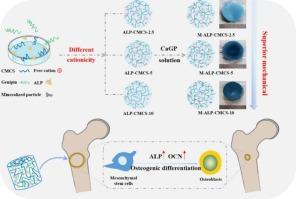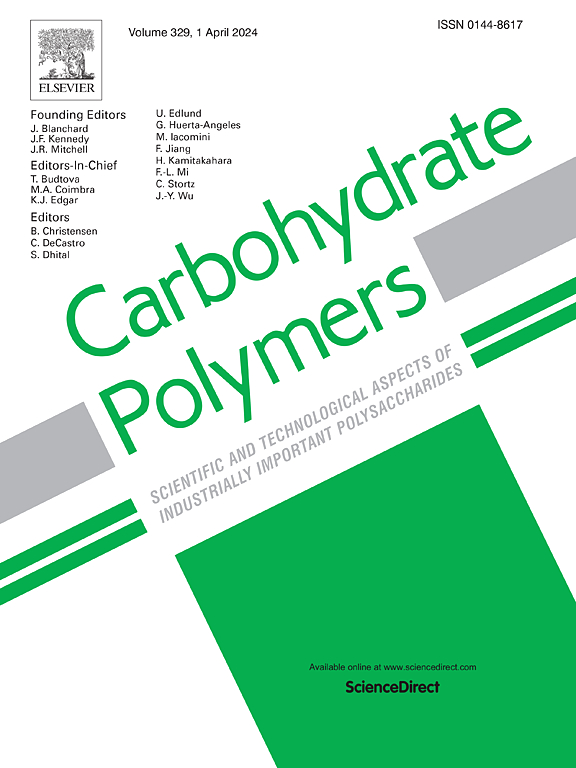具有卓越机械和成骨特性的强化酶矿化壳聚糖水凝胶
IF 10.7
1区 化学
Q1 CHEMISTRY, APPLIED
引用次数: 0
摘要
作为一种天然阳离子聚合物材料,壳聚糖水凝胶由于机械强度较差,在骨组织工程中的应用受到很大限制。为有效改善水凝胶的机械性能,酶矿化技术受到越来越多的关注。本研究制备了与不同浓度的基因素(2.5%、5% 和 10%)交联的羧甲基壳聚糖(CMCS)水凝胶,并通过酶诱导的仿生物矿化作用使其进一步矿化。矿化后,CMCS 水凝胶的机械性能显著提高,储存模量提高了 1200-1500%,甚至表现出一定的拉伸性能,伸长率达到 30-35%,这可能是由于矿化产物形成均匀且尺寸较小。有趣的是,壳聚糖的阳离子性对矿化水凝胶的矿化行为和力学性能也有重要的调节作用。此外,酶法矿化水凝胶在体外显示出更强的生物相容性和成骨分化能力,这可能是由于其优异的机械性能和引入了磷酸钙生物矿物质。体内实验进一步表明,酶矿化水凝胶具有出色的成骨活性。总之,调整阳离子度和酶矿化为制备具有优异机械和生物特性的壳聚糖水凝胶提供了一种有效的方法,可用于骨组织工程。本文章由计算机程序翻译,如有差异,请以英文原文为准。

Reinforced enzyme mineralized chitosan hydrogels with superior mechanical and osteogenic properties
As a natural cationic polymer material, the application of chitosan hydrogel for bone tissue engineering has been greatly limited due to its poor mechanical strength. Enzymatic mineralization has drawn increased attention to effectively improve the mechanical properties of hydrogels. In this study, carboxymethyl chitosan (CMCS) hydrogels cross-linked with different concentrations of genipin (2.5 %, 5 % and 10 %) were prepared and further mineralized through enzyme-induced biomimetic mineralization. The mechanical properties of the CMCS hydrogels were significantly increased as a result of mineralization, showing improvement of 1200–1500 % on storage moduli, and even exhibiting certain tensile behavior with the elongation rate of 30–35 %, likely due to the uniform formation and small size of mineralized products. Interestingly, the cationicity of chitosan also exerted an important modulation effect and the mineralization behavior and mechanical properties of mineralized hydrogels. In addition, the enzymatic mineralized hydrogels showed enhanced biocompatibility and osteogenic differentiation in-vitro, likely due to its superior mechanical properties and the introduction of calcium phosphate biominerals. In vivo experiments further suggest excellent bone-forming activity for the enzymatic mineralized hydrogels. Overall, tuning cationicity and enzymatic mineralization provide an effective approach for the preparation of chitosan hydrogels with superior mechanical and biological properties for bone tissue engineering application.
求助全文
通过发布文献求助,成功后即可免费获取论文全文。
去求助
来源期刊

Carbohydrate Polymers
化学-高分子科学
CiteScore
22.40
自引率
8.00%
发文量
1286
审稿时长
47 days
期刊介绍:
Carbohydrate Polymers stands as a prominent journal in the glycoscience field, dedicated to exploring and harnessing the potential of polysaccharides with applications spanning bioenergy, bioplastics, biomaterials, biorefining, chemistry, drug delivery, food, health, nanotechnology, packaging, paper, pharmaceuticals, medicine, oil recovery, textiles, tissue engineering, wood, and various aspects of glycoscience.
The journal emphasizes the central role of well-characterized carbohydrate polymers, highlighting their significance as the primary focus rather than a peripheral topic. Each paper must prominently feature at least one named carbohydrate polymer, evident in both citation and title, with a commitment to innovative research that advances scientific knowledge.
 求助内容:
求助内容: 应助结果提醒方式:
应助结果提醒方式:


